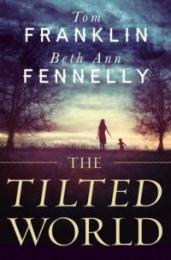 Tom Franklin’s latest book came out well timed to help me in my bid to read books by authors that I’ve read before and enjoyed. A while ago I read his 2011 Dagger Award winning novel, Crooked Letter, Crooked Letter. His new novel, The Tilted World, is co-written with Beth Ann Fennelly, a poet and Tom Franklin’s wife. Co-written novels are an interesting proposition, I always view writing novels as such a solitary, private process. That extreme level of collaboration must require an intimate relationship so I guess a husband and wife team makes sense. Or they could just end up killing each other in the process.
Tom Franklin’s latest book came out well timed to help me in my bid to read books by authors that I’ve read before and enjoyed. A while ago I read his 2011 Dagger Award winning novel, Crooked Letter, Crooked Letter. His new novel, The Tilted World, is co-written with Beth Ann Fennelly, a poet and Tom Franklin’s wife. Co-written novels are an interesting proposition, I always view writing novels as such a solitary, private process. That extreme level of collaboration must require an intimate relationship so I guess a husband and wife team makes sense. Or they could just end up killing each other in the process.
It’s April 1927 and the inhabitants of the fictional town of Hobnob, Mississippi are fighting to stop the levee of their bend in the Mississippi River from breaking. After months of almost nonstop rain the Mississippi is dangerously high and threatens to flood. Fennelly and Franklin based their novel on the real events of the Mississippi flood on Good Friday, 1927. The flood was one of the worst natural disasters America has experienced, flattening almost a million homes and drowning twenty-seven thousand square miles.
Against this backdrop, Dixie Clay brews moonshine for her bootlegger husband, the handsome Jesse Holliver. Once captivated by his charm, Dixie Clay now sees him for the dangerous, conniving man he really is. As Prohibition nears its death, revenue agents and World War I veterans Ham and Ingersoll travel to Hobnob to find out what happened to their missing predecessors. Meanwhile, saboteurs from New Orleans are trying to collapse Hobnob’s levee in order to ease pressure on their own segment of the river. And an orphaned baby forces Ingersoll and Dixie Clay’s lives to intertwine.
The Tilted World is beautifully written. It has Franklin’s eye for small domestic details seen in Crooked Letter, Crooked Letter, but with added beauty and tenderness – ‘its Victrolas cupping their ears to the glass to listen for a pause in the monotonous song of the rain’, a fox paddling through flood waters, its ‘tail rising from the water like a question mark.’
I don’t think it’s really giving anything away to talk about the central romance. Dixie Clay and Ingersoll know each other for two weeks, a tumultuous, life-altering two weeks, but a short time nonetheless. The cynic in me finds the sudden romance a tad clichéd and convenient but really they’re both in love with the baby. They were each in desperate need of family, so I suppose it all makes sense in the end.
On the topic of both the love story and the writing, you can tell the sex scene was co-written by a poet. Normally that kind of grandiose rendering of a basic human act would make me want to vomit a little but I didn’t hate it.
They were rocking together, a rescue boat, and then words and ideas of words fell away and they were thrust into the golden light that bodies can climb to. They were there and there and there. Stillness at the height.
It’s kind of beautiful. But maybe a bit too much for me.
The characters are all well-drawn and filled in – you feel for them when they bleed, when they cry, but sometimes they felt like the obvious choices. Dixie Clay is a wonderful character. Her first meeting with Jesse is excellent – selling the furs she caught, skinned and stretched herself, a girl trying to best a grown man at bargaining. But she’s still a feisty tomboy who falls for a charming man with big ambitions, when she really belongs with the caring, solid, somewhat less attractive guy. Although, I think the character choice says more about the plot direction – a universality of story made whole with precise, intimate details.
Franklin and Fennelly paint a slight yet perfect little picture of life on the Mississippi, while echoes of the wider world reverberate – the early twentieth century jazz scene, Prohibition, the 1927 flood, Hoover’s bid to become the next president, and a hint of World War I. The Tilted World is a wonderful miniature etching of a far grander landscape.

